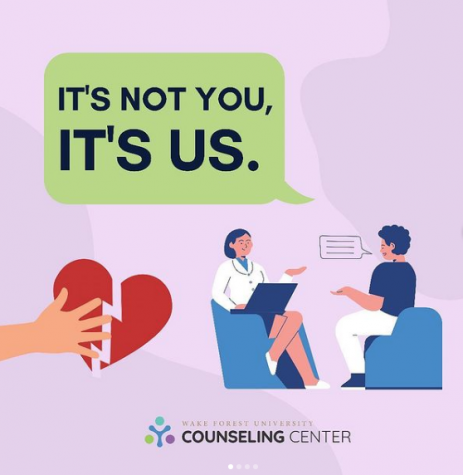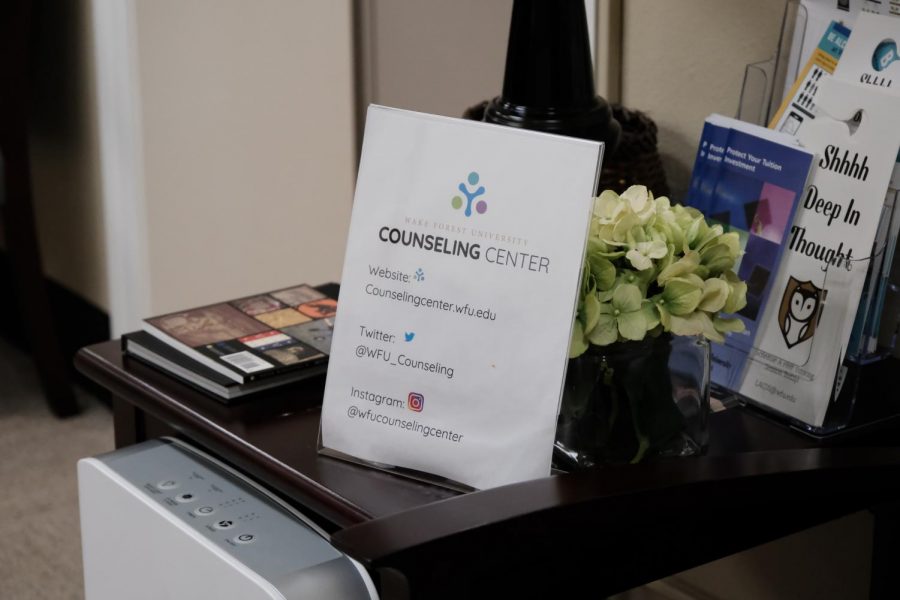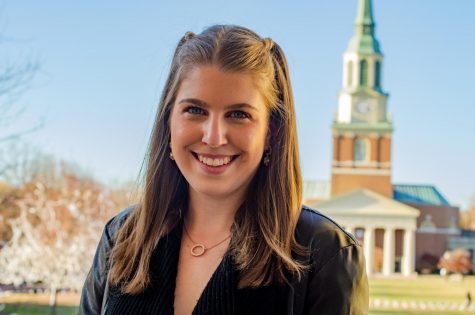UCC is reconfiguring its treatment model
The UCC announced it will move away from a long-term treatment model starting Nov. 1
The University Counseling Center will return to its pre-rapid access treatment model starting next semester, according to Director Dr. Warrenetta Mann. The university will also offer free tele-health sessions.
October 21, 2021
As national news headlines focus more on mental health and wellbeing — especially in light of recent events surrounding the death of a student at the University of North Carolina — there is increased scrutiny on the resources universities provide to help students through difficult times.
At Wake Forest, many turned their attention to an Oct. 11 Instagram post by the University Counseling Center (UCC) detailing changes that will become effective Nov. 1. UCC Director Dr. Warrenetta Mann outlined the concept behind the restructured model and envisions it as a more effective approach to care.

“We are focusing on anticipating the most salient needs of our students and addressing those through groups, workshops and brief targeted individual therapy,” Mann said. “This model will allow more students to get what they need in a timely manner. Students will continue to receive the support they need to grow and develop through whatever challenges they encounter.”
Wake Forest’s Health and Wellbeing team is restructuring the UCC’s current methods to support students. Going forward, they will employ the Thrive model, which they consider to be a more comprehensive approach to overall wellbeing.
Several offices, such as Campus Recreation, the Office of the Chaplain, Student Health Services, The Center for Learning, Access and Student Success and the Office of Wellbeing are collaborating to implement the Thrive Model in the UCC. That model encompasses eight dimensions of wellbeing: emotional, environmental, financial, intellectual, occupational, physical, social and spiritual.
Although Mann seems optimistic about the new model, it seems some students are apprehensive, others are even alarmed by the sudden announcement by Instagram of a new treatment model. The post outlined the new single-session model, which is designed to help students “address concerns in 1 to 4 sessions” and the potential referral to off-campus resources.
“I have had conversations with individuals about the restructuring of the UCC, and I have to say that none of the comments were positive,” sophomore and psychology major Micaela Ciambrone said.
Ciambrone went on to say that the manner in which the center announced the changes was not, in her and her peers’s opinions, ideal, either.
“[Students] believe that the way the UCC went about announcing these changes was insensitive, especially regarding the Instagram post that they put out,” Ciambrone said. “People thought the Instagram post was trying to cast attention away from the fact that, yet again, the counseling center was severely understaffed and could not adequately care for students.”
She continued: “Even when I showed people this post who had not been involved with the counseling department they laughed and said things like ‘that’s ridiculous’ to the Instagram post.”
Mann did not directly explain the cause for the sudden change, but she gave insight into the faults of previous methods and the need for modification.
“The traditional counseling center model has become less and less effective as a campus strategy over the last several years,” Mann said. “More and more students are coming to campus already engaged in mental health services. So we needed to look at what was working, and we did that. This model will allow us to serve more students in a more timely manner by focusing on the help they need right now to be successful.”
With the increased demand for mental health services, Ciambrone believes it will be difficult to achieve a client-patient relationship in just a few interventions, and if necessary, find off-campus support.
“A lot of people cannot afford outside therapy as their insurance does not cover it, or because it simply is not accessible due to the fact that mental health services are in such high demand right now,” Ciambrone said. “This change is leaving countless individuals on this campus bereft of care. I believe a comprehensive therapy approach involves establishing a rapport with the client or patient, which is just not achievable in one or a few interventions.”
Ciambrone continued: “I believe that a multi-session model is the best way to obtain a person’s trust and therefore make the therapy productive. Without that rapport, I believe that therapy is surface-level and lacks effectiveness.”
Students have even expressed concerns to Mann about the restructure, but she maintains her faith in the university’s efforts in implementing effective and fair changes for students.
“As with any change, students and parents will be anxious at first,” Mann said. “However, I think in the end, students and parents will be pleased with the increases in availability and options they have. It is healthy to question something you don’t yet have experience with or understand.”
Mann continued: “We have talked this over with a lot of close campus partners to make sure it is a good fit for Wake Forest before making a decision to implement these changes. Before long, it will become a part of how we do things here and that is how culture changes.”
It remains to be seen whether or not the change will have a positive impact on the campus community, but there is hope.
“I think the immediate impact will definitely be a drop in the overall mental health of students as they won’t be able to quickly access new care, again due to the waitlists and costs,” Ciambrone said. “Taking away such a valuable resource is bound to have this effect, but this begs the question of the effectiveness of the counseling center prior to this change: Were they really reaching peak effectiveness? I know people in crisis who were sent to interns due to the understaffing and were then told the interns didn’t know how to address the situation.”
“I think that if this change allows the counseling center to regroup and accumulate substantially more individuals, this change could be a positive thing,” Ciambrone said. “If this change is what it takes for the counseling center to turn around, then I am in full support.”
Ciambrone added: “They need to ensure that all clients have access to outside care, though, and I simply don’t believe that to be possible given the situations I mentioned.”
Although the UCC is working to restructure their model, they still have the same goals regarding the wellbeing of students.
“The role of college counseling is to support students to be able to meet their educational goals, and to learn skills for managing their mental health for a lifetime of success, “ Mann said. “Our future is to continue to do that for generations to come.”














